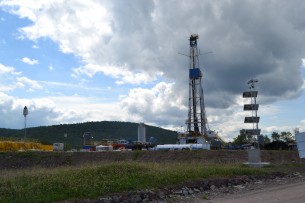During the summer of 2013, I conducted research alongside Associate Professor of Management, Jamie Hendry with support of the Place Studies Initiative. Jamie and I decided to explore a hot topic: fracking. Specifically, we were curious about how landowners weighed the pros and cons of leasing mineral rights. As a student who studies Management and Gender Studies, I was interested in the gender component of how decisions are made.
In order to gain a better understanding of the power dynamics within relationships, I drew on a set of research on family relations. I also consulted a number of sources to learn about the process and history of hydraulic fracturing.
Jamie and I conducted a number of interviews of landowners in Lycoming, Sullivan, Bradford counties; most of the participants were approaching or enjoying retirement, and professionals who are directly or indirectly connected to the gas industry. None of the landowners had a well placed on their property, and most had leased dozens of acres.
There were a number of common themes we uncovered about people’s perception of fracking (when it wasn’t on their land):
- Overall positive perceptions of natural gas companies
- People see the tangible economic benefits around them
- Creation of a new meaning of what land is worth
- People who did not lease were depicted as having strong ideologies that prevented them from doing so
- People felt that their decision not to lease wouldn’t matter if everyone around them signed a lease
- Many expressed an interest in alternative energy sources, once the technology is developed affordably
- Landowners who leased feel pride in being an energy provider to their community and country
- Traffic was noted to be the most noticable change in regions with heavy fracking
Gender alone did not predict which spouse had more weight in the decision making process. In most relationships, the spouse with more decision making power was the one who was considered to be more of an “expert” on the subject, usually due to their occupation.
Another factor that influenced how couples made decisions was their perception of the purpose of land. Those who believed that land was best in a natural, pristine state had reservations about signing a lease, while those who saw land as an asset that landowners should get the greatest number of benefits from.

Leave a Reply
You must be logged in to post a comment.